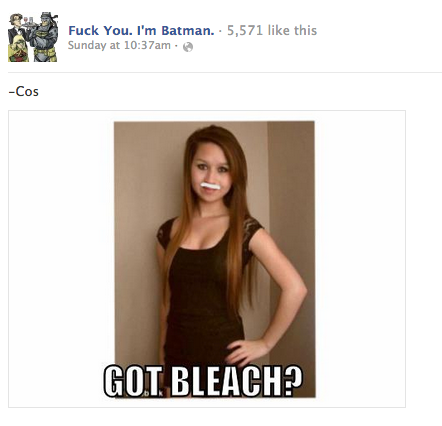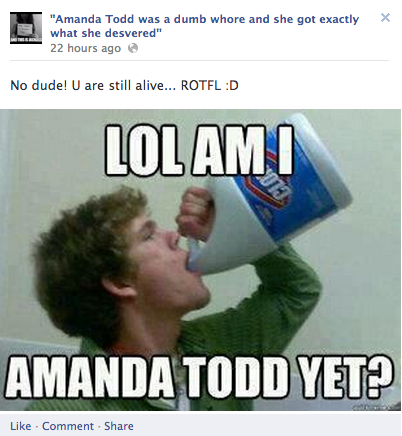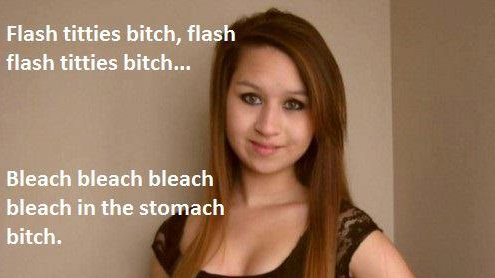Bullies are after Amanda Todd even eight days after her death.
She’s a dumb whore, they still say. She got exactly what she deserved. They write that she’s a slut—that she only did it for attention.
More than one week after the 15-year-old Vancouver girl committed suicide on Oct. 10 because she couldn’t shake a string of cyberbullies, they’re still coming after her—vicious as ever, ready to evoke a string of pain and suffering on the soul of a girl who’s no longer there.
Twelve hours east in Calgary, three women are trying to put an end to the abuse. They’re one-time victims of bullying themselves; they know how bad it hurts. And on Facebook, they see how people talk.

Last week those three women—Lindsay Ulsifer, Christine Claveau, and Melissa Buck—started a Facebook group, We Are Against Bullying.
The group’s mission is simple: They’re out to put an end to cyberbullying.
“It’s completely different now,” Buck, 22, told the Daily Dot. “It used to be bullying by people talking about you and telling you rumors about stuff you did.
“Now it’s a whole new level, and it’s risky. It’s everywhere. There’s Facebook. There’s MySpace. There’s YouTube. There’s Twitter. There are so many places that you can bully, and it’s completely out of hand.”
Buck would be one to know. When she was 16 and living in Utah, she was so severely bullied by her classmates that her family moved to Canada.
“School, church, recital. It was like Amanda Todd until my parents figured out what was going on,” she said. “And then they decided to move me up here to get me into a better atmosphere.
“That’s moving countries just to get away from it, so I can’t imagine how bad it must be for other people today. Having access to the Internet, people don’t even have to bully in person. They can go on and make any page that they want, and they can say anything that they want. They get the attention that they want, and then they delete it, and no one knows the source.
“It’s not just that they can say you’re fat. They can post it all over Facebook and make a page about it and share it.”

It’s those pages that Buck and her two cohorts have decided to go after. Since Friday, the W.A.A.B. brass and their ever-growing group of supporters (W.A.A.B. had grown to over more than 1,000 at press time) have collected the links to Todd-trolling Facebook pages and posters, reporting them for abuse of Facebook’s nine-point Community Standards, which detail the billion-person community’s policies on hate speech, threats, pornography, bullying, and harassment, among other things.
In one instance, the group has even sparked a professional firing. Earlier this week, an Ontario man named Justin Hutchings lost his job at a Mr. Big & Tall after Claveau saw that he’d written “Thank god that bitch is dead” on an Amanda Todd memorial page and reported him to the company’s CEO.
So far, the group has successfully helped remove more than 20 of those pages from Facebook—a great success when you consider that W.A.A.B. is hardly the only anti-bullying advocacy on the network— though they’re not batting a thousand, either. Despite their efforts, and their convictions, Facebook is quick to remind good samaritans that “reporting a piece of content does not guarantee that it will be removed from the site.
“Because of the diversity of our community, it’s possible that something could be disagreeable or disturbing to you without meeting the criteria for being removed or blocked. For this reason, we also offer personal controls over what you see, such as the ability to hide of quietly cut ties with people, Pages, or applications that offend you.”

Buck said that’s not enough. She professed that Facebook’s a behemoth—a civilization as large as the entire populations of India or China—and tracking every abusive page or post simply isn’t possible no matter the size of human resources. She said the company needs to take a stand and do whatever it takes to rid the community of trolls like these, of people who feast on abusing the ones who can’t fight back.
“They need to make a button that says ‘This person is bullying somebody,’” she said. “Right now there’s only an option that says ‘Someone’s harassing a friend.’ We can do that, but [Facebook] may not take take it down because they know that we’re not friends with Amanda Todd. Facebook needs to take a stand and make a button that reports on bullies.”
Ulsifer took Buck’s thought one step further.
“There needs to be some sort of moderator to see what the language is like in these groups. There needs to be someone watching the words that are made, the images that are used.
“It’s not hard to create an application to scan for words. If I created a completely inappropriate page with some swear words, it should have to go through a database to make sure that anything terrible is in there.”

Such a development is unlikely considering the length of Facebook’s programming laundry list, but the sentiment stands. Right now, anybody can log on to the site and create a page that projects any type of message imaginable, from “Kill Mitt Romney” to “God Hates Fags.” That page can then be populated, published, and shared with barely a breath of verification procedures thisrequired.
After that happens, 5,500 people get a post on their news feeds with the word “Ragequit” attached to a picture of Amanda Todd.
Buck said the two want to get into offline anti-bullying advocacy after they make their impression felt online. They want to build a nonprofit organization and to visit schools to talk about bullying. They want to work with principals, administrators, guidance counselors, and parents to give them the roadmap for bullied children.
“I just want to help one person decide that there’s people there to help them and they won’t commit suicide,” Ulsifer said. “That they’re going to get the help that they deserve.
“I’ll take all the negative messages if we can help just one.”
Photo via Amanda Todd/Facebook


